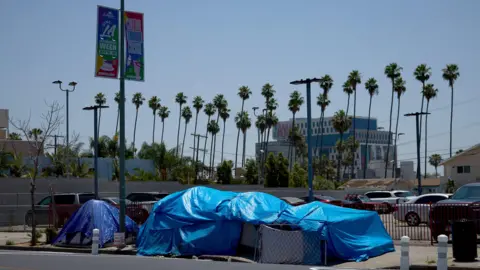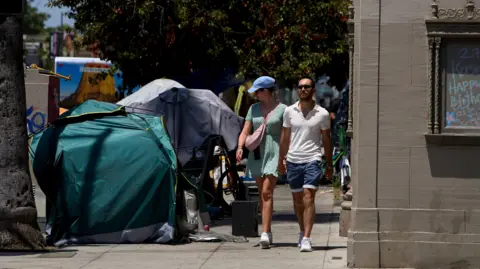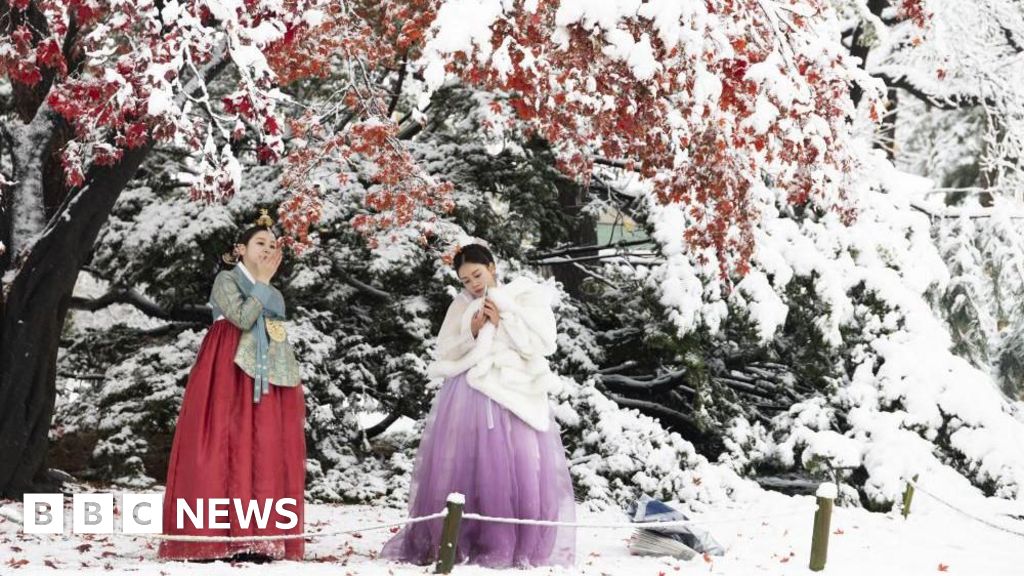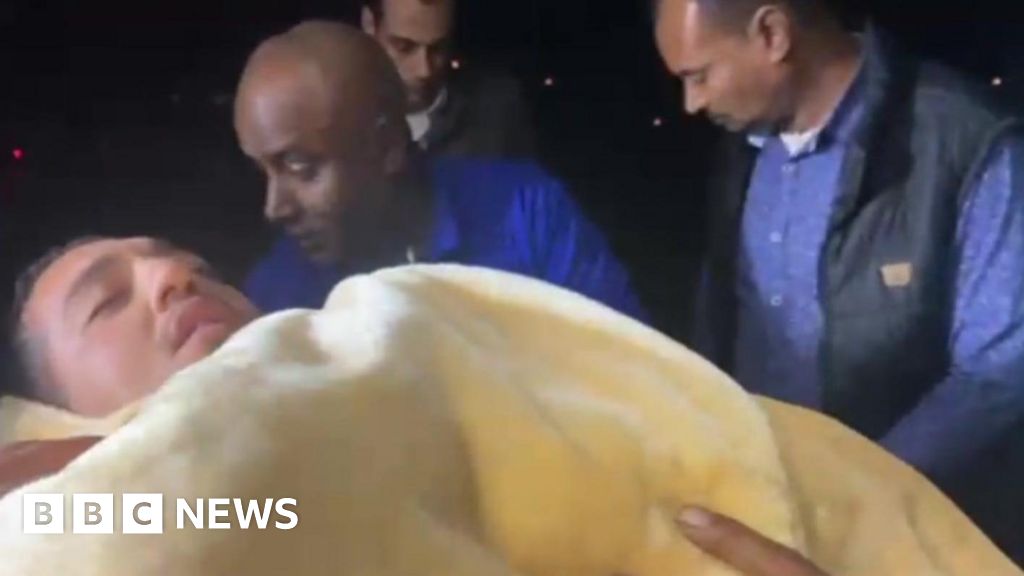ARTICLE AD BOX
25 minutes ago
By Sam Granville and Christal Hayes, BBC News, Los Angeles

 EPA
EPA
Experts say arresting or fining people sleeping outdoors will deepen the problem by making it harder for these individuals to get out homelessness.
"I still have 20 more minutes before I have to move," Anthony yelled from his green tent on a Hollywood sidewalk as he heard footsteps approaching.
Officials in Los Angeles had come by earlier to warn him that he could face arrest if he didn't move his belongings.
They told him about the recent Supreme Court opinion that opened the door for cities and states across the US to punish anyone sleeping outdoors — the most significant ruling on homelessness since at least the 1980s, when many experts say the modern US homeless crisis began.
It's added to the lengthy list of worries Anthony says he already has.
"I’m just trying to survive,” he told the BBC while laying down in his tent, using a blue backpack as a pillow.
A black trash bag sits inside, filled with what belongings he can carry as he moves from one area to the next.
“Some nights I don’t get no sleep,” he said. “I’ve been tired all day. I just want to lay somewhere comfortable and get a good nap in. And that’s it. I am not bothering nobody.”
Moments later, Anthony packed up his tent and went looking for a new place to call home.
The high court’s ruling is already having a ripple effect on cities across the country, which have been emboldened to take harsher measures to clear out homeless camps that have grown in the aftermath of the pandemic.
Many US cities have been wrestling with how to combat the growing crisis. The issue has been at the heart of recent election cycles on the West Coast, where officials have poured record amounts of money into creating shelters and building affordable housing.
Leaders face mounting pressure as long-term solutions - from housing and shelters to voluntary treatment services and eviction help - take time.
“It’s not easy and it will take a time to put into place solutions that work, so there’s a little bit of political theatre going on here," Scout Katovich, an attorney who focuses on these issues for the American Civil Liberties Union (ACLU), told the BBC.
"Politicians want to be able to say they’re doing something,”
The problem, Ms Katovich and other advocates say, is arresting or fining the homeless will only worsen the problem.
“This tactic simply kicks the can down the road. Sure, you might clean up a street but the people you arrest will surely be back.”
Homeless numbers hit new records in 2023
The high court's ruling last week didn’t mandate how cities and governments should handle homelessness - but it gave communities leeway to take more severe measures without the fear of legal recourse.
The case began in the small city of Grants Pass, Oregon, with a population of around 40,000. Over the last 20 years the city doubled in size, but its supply of affordable and public housing did not keep up. Housing prices skyrocketed and the number of homeless grew.
Elected leaders passed laws allowing the city to issue $295 (£230) fines - or 20-day jail sentences for repeat offenses - to unhoused people sleeping or camping in public. Three homeless people sued the city in 2018 after they received multiple citations they were unable to pay.
An appeals court found such laws virtually banned homelessness and amounted to cruel and unusual punishment.
The Supreme Court finally ruled that cities were clear to prohibit homeless people sleeping outside in public places.
“A handful of federal judges cannot begin to ‘match’ the collective wisdom the American people possess in deciding ‘how best to handle’ a pressing social question like homelessness,” Justice Neil Gorsuch wrote in the majority's opinion.
Theane Evangelis argued this case before the Supreme Court on behalf of Grants Pass.
She says city officials had their hands tied because they could not force anyone into a shelter. She argues those who refuse to use the services offered end up staying in encampments.
“Living in tents is not a compassionate solution, and it's not treating people with dignity. And so the Supreme Court's decision was remarkable in the degree to which it listened to those cities,” she said.
Leaders in Grants Pass say they plan to examine the Supreme Court opinion before making a plan on whether to enforce its ban on encampments.
The ruling comes at a critical time for the unhoused.
Last year, the US tracked the highest numbers of homeless people since 2007 - when the US Department of Housing and Urban Development started tracking such data.
There were 653,104 homeless people counted as part of the agency's yearly homeless assessment in 2023. That's a nearly 11% increase from the year prior.
Advocates work to steer away from arrests

 EPA
EPA
The ACLU has been tracking the reaction to the decision by city leaders across the US.
It has already sent a letter to Manchester, New Hampshire, after the mayor promised to ban encampments to “make our streets safe, clear and passable”.
Other city leaders, like the mayor in Lancaster, California, have promised to “be much more aggressive” against encampments in neighbourhoods and near stores.
Mayor R Rex Parris told the Los Angeles Times “we’re going to be moving them really fast”.
State lawmakers in Oregon also seem poised to look at changing laws that will give them greater latitude to rid homeless camps, local media reported.
In Spokane, Washington, leaders are asking authorities to dismantle more camps.
But fining people who don’t have the means for housing worsens their finances, advocates say.
Arresting them can make it harder to find a job or housing, experts told the BBC.
“There is mounds and volumes of evidence showing that having an unpaid citation and a warrant out for arrest, let alone in incarceration, prevents people from accessing housing, jobs in other places," Chris Herring, an assistant professor of sociology at the University of California in Los Angeles told the BBC.
"It actually prevents people from accessing shelter.”
Not all cities have welcomed the court decision.
In Los Angeles, the mayor called the ruling “disappointing” and vowed to continue investing in affordable housing, voluntary treatment and eviction protections.
Days after the opinion, the city released a homeless count showing the first drop in nearly six years.
Advocates say it is a prime example that other cities can learn from.
“Real change takes time,” Sasha Morozov, a regional director for PATH, a leading homeless provider in the Los Angeles area, told the BBC.
Ms Morozov noted, though, outreach teams in the greater Los Angeles area are still working to inform those living on the streets about the Supreme Court’s ruling. Teams are also preparing for increased demand for legal services.
Jailing the homeless? ‘At least I’ll have a bed’
Around the corner from Anthony, Topher Williams, 28, calls a makeshift tent on a sidewalk home.
Black and blue tarps are tied to tree branches and street parking poles. Plywood boards line the edges of the structure, which he calls a three-room apartment.
Mr Williams, who told the BBC he was an Army veteran, has been living on the streets for four years. An unlucky combination of medical expenses and the pandemic's economic struggles left him without a job or shelter.
Like Anthony, he’s frustrated at the lack of compassion from city officials and law enforcement.
“It's mind blowing the way people look at us. The way people straight up treat us like we're like less than animals. And they have no idea,” he said, tears welling in his eyes.
“I served eight years in the military. I did two tours of duty. I gave the ultimate sacrifice fighting for this country, and to be treated like I’m a second-class citizen is wild.”
Asked if he was scared about potential arrests, he said it's part of this way of life.
“We’ve got a lot that we have to deal with already. A lot of the things are kind of stressful. But I don’t worry about things until they start affecting me.”
Like Topher, Anthony said being arrested may not be the worst outcome.
“At least I’ll have a bed and maybe I’ll be in the system and get the right kind of help.”

 4 months ago
33
4 months ago
33








 English (US)
English (US)